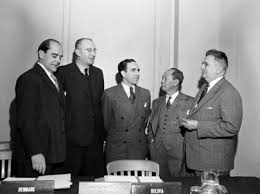Britain Rejects U.N. Appeal on Immigration, NY Herald Tribune, Jan. 22, 1948.
 Click here to view the original article.
Click here to view the original article.
By Kenyon Kilbon
LAKE SUCCESS, L. I., Jan. 21.-Great Britain flouted a part of the United Nations General Assembly resolution on Palestine for the first time today by refusing to open up a port and hinterland area in the Holy Land by Feb. 1 for increased Jewish immigration.
At the same time, the British told the U. N. flatly that they will continue to drive away ships carrying “illegal” Jewish immigrants to Palestine, and that they intend to maintain the current immigration quota of 1,500 Jews a month until the British mandate is ended.
The news was handed to the U. N. Palestine Commission this afternoon by Sir Alexander Cadogan, British U. N. delegate, and it meant that the first deadline in the Assembly’s resolution-the opening of a Jewish immigration port eleven days from now-will not be met.
The principal reason for the British refusal, Sir Alexander told the commission, is a fear that uncontrolled immigration of Jews into Palestine at this time would “jeopardize an already delicate situation” and create new troubles for the security forces in the Holy Land.
Regardless of the reason the British attitude is expected to have serious repercussions. Moshe Shertok, political head of the Jewish Agency for Palestine, said last week that the Feb. 1 date had acquired symbolic importance in Palestine as a possible barometer to indicate success or failure of the whole U. N. partition scheme.
Sir Alexander’s statement therefore is expected to please the Arabs, who are whole-heartedly opposed to the partition plan, and to displease the Jews. One of its results, according to Jewish representatives, may be to encourage Arabs who have taken a fairly neutral attitude up to now to turn toward violence.
The British intentions on immigration, amounting to maintenance of present policy until the mandate is ended on or before May 15, were announced to the commission in answer to four questions put by commission members to the British government.
To the crucial question regarding British intentions to honor the Assembly recommendation for a Jewish immigration port by Feb. 1, Sir Alexander replied-
“His Majesty’s Government in the United Kingdom have repeatedly made it clear that so long as the mandatory regime is maintained they must retain undivided control over the whole of Palestine. For this reason it is not possible for my government to comply with the recommendations concerning evacuation of a Jewish port and hinterland so long as the mandate continues.”
After emphasizing the security danger in increased Jewish immigration, Sir Alexander pointed out that the Assembly resolution had put no obligation on the British or the commission in this instance-it had merely recommended that the mandatory power (Great Britain) “use its best endeavors” to open a port.
He said the British government had used its best endeavors, but had finally decided that the security risk would be too great. He did not explain, however, why the British answer was being given only eleven days before the deadline.
The commission wanted to know also what the British intend to do about the Jewish immigrants who have been seized and detained on Cyprus after trying to enter Palestine without British authority, and here the British answer was less definite.
The British government, Sir Alexander said, has already announced that it “cannot permit Jewish illegal immigrants to remain on British territory” after the withdrawal of British forces from Palestine. Arrangements for removal of Jews from Cyprus, he added, is a matter for negotiation between the commission and the British government.
Great Britain is willing to release from detention two ships-the Pan York and the Pan Crescent-to carry the Cyprus detainees to Palestine, he said, but the transportation part of the problem can be settled between the commission and the Jewish Agency. Both ships were seized by the British some time ago while they were carrying unauthorized Jewish immigrants.
The other two questions concerned British intentions on immigration between now and the end of the mandate, and whether ships carrying unauthorized immigrants to Tel Aviv after Feb. 1 will be intercepted. To these, Sir Alexander answered that the present quota of 1,500 Jewish immigrants a month will be continued, and that therefore the ships would be stopped.



